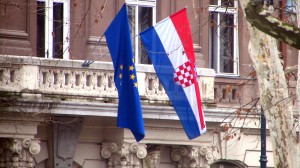Croatia received optimistic news with the Oct. 14 release of the European Commission’s 2009 enlargement strategy and progress reports for candidate countries.
In almost all areas of accession, it scored high marks and praise for its progress in preparing for joining the European Union. Most indications show that the Balkan country is on track to accede to the EU in late 2010 or 2011.
The passage of the Lisbon Treaty in a referendum in Ireland on Oct. 2 forecast favorably on the candidate country’s ambitions. The treaty, designed to streamline the EU’s decision-making process, prepares the bloc for enlargement. Although the Czech Republic’s president Vaclav Klaus has yet to sign off on the treaty (the last country to do so), pressure is mounting from much of the EU and within his own country.
Iceland, too, may boost Croatia’s bid. Olli Rehn, the EU commissioner for enlargement, stated in January 2009 his preference for admitting countries in groups rather than individually. Neither Turkey nor the former Yugoslav Republic of Macedonia, the two other official candidate countries, is close to being ready for admission.

The European Union should stringently enforce accession standards before letting Croatia in — Latvia would be in better shape now if the EU had done so.
Notwithstanding Croatia’s momentum, officials in Brussels should be wary of speedy accessions, as previous enlargements have demonstrated the value in a patient, rigorous vetting of potential member states. For Croatia, pressing economic and political issues still need to be addressed before accession. If rushed into admitting Croatia, the EU will have more difficulty in overseeing the changes it desires once it becomes a member, as the example in Latvia illustrates well.
The financial crisis has impacted all members of the EU, but arguably none as much as Latvia. The Baltic economy has nearly collapsed, relying on EU and International Monetary Fund loans to stay afloat. Latvia’s employment rate has risen upwards of 17 percent and the economy has shrunk by nearly 20 percent according to The Economist. The real estate market has crashed. Yet, politicians may exacerbate the decline by clinging to their valued euro-peg and vacillating on loan commitments to the EU and IMF. Despite urging from EU commissioner for monetary affairs Joaquín Almunia, Latvia’s Prime Minister Valdis Dombrovskis has yet to make necessary spending cuts. Thus, the experience has shown the EU is largely powerless in pushing reforms in member states.
To its credit, Croatia has fared the financial crisis better than some of the EU’s own member states due to sound monetary policy. However, the crisis has revealed the country’s reliance of foreign credit, up to 40 billion euros which is 90 percent of its GDP, according to Reuters. Latvia, too, relied on foreign credit during its boom years at the beginning of the 21st century.
Although Croatia will not likely take a sharp downturn like Latvia, it could suffer from a sluggish economy unless large economic reforms are made. The Commission report found that the country lacked a medium-term economic strategy and that structural reforms have only seen limited progress. In early October 2009, the IMF recommended reducing foreign capital dependence, reduce the government’s share of the economy, and diversifying to sectors beyond tourism. But officials in Zagreb, like those in Riga, insist on managing their economy on their own. So, unless the EU can pressure these reforms before admission, the still-emerging Croatian economy could become a drag on the EU like Latvia is now.
Other political examples further give reason for comprehensive, lengthy accession negotiations with Croatia. Latvia still suffers from political corruption. The construction of the Southern Bridge in Riga in 2008 certainly raised some eyebrows, when its cost ballooned from a little over 100 million lats (€140 million) to nearly 570 million (€803 million). A state audit in March 2009 revealed that 27 million lats (€38 million) had simply been wasted. And Latvia is not the only offender; the European Commission released in July 2009 a scathing justice and home affairs report on Bulgaria and Romania, which acceded in 2007, citing the two country’s problems with persistent government corruption and organized crime. Now the EU struggles to address such corruption, except for trying to expose it.
The commission found some of the same issues in its report on Croatia. Areas needing more intensive reforms in the Balkan country included judiciary and fundamental rights, fighting corruption and organized crime, competition, and transport. The EU and outside observers like Amnesty International have criticized the country for not investigating war crimes impartially and without discrimination. Unless the EU can eliminate these concerns now, corruption in Croatia will persist.
The consequences of past, hurried enlargements should be a reminder that both the EU and the candidate country benefit from a comprehensive accession process. The EU has limited means of resolving internal issues of member states, compared to leverage the process of conditionality that accession affords. At the release of the progress reports, Rehn spoke of the EU’s transformative power; however, that power is all but lost once a country becomes a member. Perhaps Latvia, Bulgaria, and Romania would be better off now if their applications were scrutinized more.
Although neither Croatia’s economic nor political problems are as severe as some other European countries, being better than the worst does not automatically qualify the country for admission. The Commission’s report should not necessarily be seen as Croatia’s green light — it should be a yellow light.
Michael G. Dozler is graduate student of international affairs who received a Fulbright research grant for study in Latvia.
Disclaimer:
Views expressed in the opinion section are never those of the Baltic Reports company or the website’s editorial team as a whole, but merely those of the individual writer.












